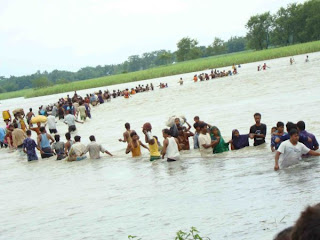My September will be more exciting than I’d expected.
Friday afternoon I was sitting at my desk typing a curriculum to train our Nepali staff in report writing. I was thinking about going downstairs to make a cup of tea when Denise, our country director, came in, worried look on her face:
“Rosie, it looks like we’re going to have to use you in the flood emergency. Is that OK?”
I suppress my smile, my excitement, say calmly, “Yes, of course, what would you like me to do?”
“I’d like you to accompany Pawan (IRC's new deputy director) to coordinate and assess our flood response in Saptari District,” she says.
Saptari is one of two districts that’s been heavily affected by the recent floods in Nepal and Northern India. My main job will be to communicate – with Denise, with media, with other INGOs, etc… Ideally I’m sure she’d have someone with more experience than me to go. But in emergencies, you cant be picky.
The background: On August 18th, the Koshi River in eastern Nepal broke through its retaining wall. The waters flooded, putting dozens of small villages underwater and forcing hundreds of thousands to flee their homes.
Since then the flooding has only gotten worse. The river – which flows to India – continues to swell, killing cows and crops, separating children from families and leaving people hungry and homeless. It’s displaced hundreds of thousands of people in Nepal so far; millions in India. (You can read more about it here or here. BBC also has a photo album of the flood.)
It’s expected to worsen. It's raining heavily. And the political response has been slow, especially in India. (The Indian district most affected, Bihar, is one of the poorest, if not THE poorest districts in India. The ethnic group that lives there - Bihars? – have little or no representation in government.) “Experts” are predicting that large numbers of displaced Indians will travel to the make-shift camps in Nepal to get the support they are not getting in India.
IRC normally does not respond to natural disasters (it focuses on conflict instead). But since we are already in this country and the need is so great, our director decided to join in the relief effort.
The past few weeks we’ve been working with UNICEF to distribute blankets and children's closing to the victims in Sunsari District, one of two affected in Nepal. But this week we’re expanding our support to Saptari, the second drenched district.
With our staff already strained to capacity and my September flexible, Denise is sending me along with Pawan to coordinate our support in this second district. I’ll learn my specific job tomorrow, but essentially it will be to communicate. And above all, to be flexible, available.
I’m excited.
I didn’t imagine I’d get such a hands on opportunity in Nepal. (Using the word “opportunity” feels funny in this situation. That’s the irony of humanitarian work, I guess: one person’s disaster becomes another persons’ opportunity.)
We leave tomorrow. I don't know when we'll be back - could be a week, could be a month or two. Whenever it is, stories to follow!
Some images from the floods:




No comments:
Post a Comment